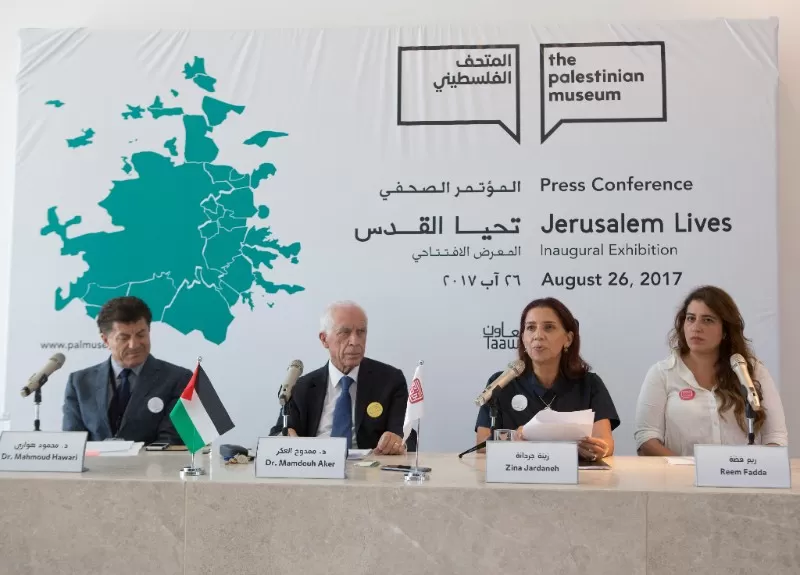
The Palestinian Museum announced yesterday the launch of its inaugural exhibition “Jerusalem Lives” (Tahya Al-Quds) at a press conference, attended by representatives of local, Arab and international media outlets. The chair and members of the Palestinian Museum Board spoke to the press about the vision of the museum and its programme. Reem Fadda, exhibition curator, introduced the exhibition and the artworks.
“Jerusalem Lives” remains open to the public until December 15th. The works of 48 artists will be displayed in the exhibition hall and the gardens of the museum. An educational and a public program will also be launched.
The exhibition consists of four chapters, the first of which is a multidisciplinary exhibition showing audio-visual materials that demonstrate the emanation, effects and limitations of globalisation in the city of Jerusalem. Commissioned or refabricated site-specific artworks by Palestinian, Arab and international artists form the second chapter and are displayed in the gardens of the Museum. The third chapter is a public programme that aims at supporting civic institutions in Jerusalem.
The fourth and the last, is the JERUSALEM LIVES catalogue that will be published together with a special edition of the Jerusalem Quarterly journal.
In her speech, Zina Jardaneh, chair of the board, explained that the idea of the Palestinian museum was born twenty years ago and changed over the years, to bring about an independent institution dedicated to supporting an open and dynamic Palestinian culture nationally and internationally. About “Jerusalem Lives”, Jardaneh asserted that the exhibition transcends geographic and political boundaries, as it brings Jerusalem from its mandatory isolation and marginalized Jerusalemites to Birzeit, and connects fellow Palestinians in the homeland and the diaspora. Zina Jardaneh added: “the exhibition lies at the core of our mission, addressing Jerusalem, the epicentre of Palestinian life and the locus of Palestinian aspirations.”
Dr. Mamdouh Aker, member of the museum board, confirmed that the Palestinian Museum, the flagship project of Welfare Association (Taawon), has a rich programme ready to be launched. He also added that “Jerusalem Lives” is a platform that addresses the world and is a reminder that Jerusalem is the city of peace and the crossroad of civilizations.
Dr. Mahmoud Hawari, the director of the Palestinian Museum, announced that the future programme includes three exhibitions over the coming two years. Hawari explained that the Museum is currently working on two digital projects, the first being an interactive timeline that will explore the history of Palestine and the second is a digital archive that will preserve various endangered collections.
Curator Reem Fadda, together with participating artists led the audience on an exhibition tour. Fadda communicated the concept of the exhibition as she explained that the major idea behind the exhibition is to produce and convey knowledge on the reality of the city and the constrains Jerusalemites face.
This exhibition is supported by a number of Palestinian and Arab donors including: The Arab Fund for Economic and Social Development, The Asfari Foundation, Bank of Palestine, Ibn Al Quds, Luay Shafiq Khoury, Dr. Nabil Hani Qaddumi, Samer Said Khoury, and Suheil Haseeb Sabbagh.
The Palestinian Museum is an independent institution dedicated to supporting an open and dynamic Palestinian culture nationally and internationally. The Museum presents and engages with new perspectives on Palestinian history, society and culture. The Museum is a flagship project of Welfare Association (Taawon), an independent Palestinian non-profit organisation, committed to providing development and humanitarian assistance in Palestine and the Palestinian communities in Lebanon.
Participating artists
Ruanne Abou-Rahme & Basel Abba, Naji al-Ali, Bisan Hussam Abu Eisheh, Nabil Anani, Nahed Awwad, Samira Badran, Tayseer Barakat, Kamal Boullata, Raouf Haj-Yahia, Khalil Halabi, Samia Halaby, Rula Halawani, Mona Hatoum, Khaled Hourani, Ahed Izhiman, Emily Jacir, Khaled Jarrar, Marwa Jbara, Muqata'a, Yazan Khalili, Bashir Makhoul, Sliman Mansour, Abdul Hay Mosallam, Ibrahim Noubani, Khalil Rabah, Khalil Rayyan, Nida Sinnokrot, Dennis Sobeh, Vera Tamari, Visualizing Palestine, Inass Yassin, Mohanad Yaqubi, Vladimir Tamari, Sultan F.N. Abdulaziz Al-Saud (Saudi Arabia), Iman Issa (Egypt), Athar Jaber (Iraq/ Netherlands), Mohammed Kazem (United Arab Emirates), Maria Thereza Alves (Brazil), Simone Bitton (France), CAMP, Rain Wu & Eric Chen (Taiwan), Bob Gramsma (Switzerland), Oscar Murillo (Colombia), Sudarshan Shetty (India), Adrian Villar Rojas (Argentina).